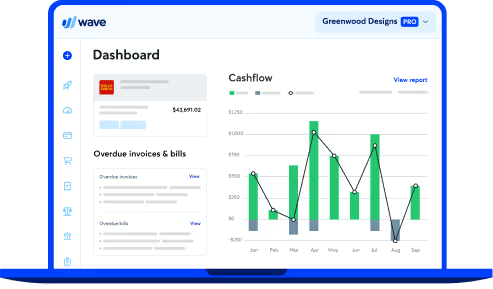
Accounting 101: A guide for Amazon merchants
Amazon has made e-commerce available to anyone with an internet connection and a bit of time. The online marketplace has made entrepreneurship more accessible than ever before.
But with more business also comes more finances to keep track of—and that’s not always a business owner’s strong suit. In fact, 80% of Amazon merchants say that bookkeeping and accounting is their biggest challenge. Boo!
But there’s good news: It only requires a little bit of time and attention to get you all setup and make finances a breeze.
Getting started
Like most things in business, if you want to streamline processes in the long-term, it requires extra work and attention upfront. The same rings true here. Before you can think about organizing your Amazon finances, there are a few steps to take in the beginning:
Separate your Amazon finances from your personal finances
You likely already have personal bank accounts. Whether you’ve already started selling on Amazon or are about to launch your store, you’ll want to open business bank accounts ASAP. This will help you keep your books clean and organized, and you won’t have to sift through tons of personal transactions to pull out the ones related to your business.
“Keeping your business inflows and outflows separate from your personal accounts will not only make bookkeeping and taxes a lot easier, but it will also get the conversation with business bankers who could potentially help you with funding down the line,” says Logan Allec, CPA and owner of Money Done Right.
While you may be tempted to go with your personal bank and open additional business accounts, there are other options out there worth exploring. Each bank and account type has different benefits and stipulations. “Every bank has slightly different rules when it comes to opening a business bank account, so be sure to call ahead so you understand exactly what information and documents the banker will need to open up your account,” says Allec.
He also recommends keeping an eye out for signup incentives, like cash bonuses for opening an account or no interest for the first year.
Jeffrey Feingold, founder and managing shareholder of Tax Point Advisors, also points out that separating your finances helps make sure you don’t miss anything.
“Whenever business records are commingled with personal records, there’s an increased risk of missed deductions, an incomplete audit trail, and potential issues with the IRS treating the Amazon merchant as less than a legitimate business,” he says. “For Amazon merchants who have a hobby component to their business, not keeping a separate business account will increase the likelihood that the IRS won’t accept business deductions under a theory that the Amazon merchant should be classified as a hobby and not a legitimate business.”
Use an accounting tool
If you’re looking to make Amazon a real business, find accounting software that goes beyond basic bookkeeping. “If an Amazon merchant is serious about being a real business and becoming a professional merchant, [one of] the first things they should do is to look into proper accounting software and tools that update sales, finances, and cash position in real-time,” says Jeffrey Feingold, founder and managing shareholder of Tax Point Advisors.
Amazon merchants seeking to become a real business should use full accounting software that goes beyond basic bookkeeping.
“Choose accounting software on the basis of organization and incorporation of double-entry accounting principles,” Feingold says. “Automation tools with Amazon can import Amazon settlement history directly into accounting software. This provides valuable information and insight from configuring useful invoices and reports that apply to various Amazon transactions.” He also says it’s a good idea to look for automated invoice and receipt backup.
Sound complicated? It’s not—especially with a tool like Wave or Wave Advisors. With Wave Advisors, you get a dedicated bookkeeper to help you maintain your records, plus an optional accounting coach for a one-time fee.
Hire help to maintain your books
Sometimes bookkeeping becomes too tedious and unwieldy of a task, requiring you to spend too much time on admin and not enough focusing on your business. That’s when it could make sense to outsource for some help.
There are two main ways you can go here:
- Virtual assistant (VA): more cost-effective; may or may not be qualified to maintain books
- Bookkeeper/accountant: professionals who are specifically equipped to handle this work; more expensive
And if you go with Wave Advisors, your monthly fee gets you access to a professional bookkeeper who can categorize transactions. reconcile accounts, organize financial statements, collaborate with your tax accountant, and more.
Update your books on a regular basis
You’ve got your business accounts set up so you can keep all your financial transactions in a single place, as well as accounting software and possibly some external help. Now what?
It’s time to set up organized systems that you can adhere to as you continue to run and grow your Amazon business.
“Keep all your receipts, invoices, refunds, promotions, etc. organized,” says Paige Knight of Gurian PLLC, a Dallas CPA firm. “Having a structure will save you a lot of time later on.”
Knight recommends pulling the Amazon sales and fees report to your accounting software at least once a month. To do this, go to Amazon’s Payment Summary and the Statements View Report and the Transactions View Report.
Allec also recommends reviewing everything on a monthly basis. “Knowing exactly how much your business is making every month is essential to making good business decisions,” he says. “Without [an organized] bookkeeping systems, you’ll likely miss out on tax deductions—you can’t deduct a business expense if you don’t know what it is.”
By adhering to specific processes, this will mitigate the likelihood of missing out on valuable entries which could save you at tax time.
Find out more things you can do today to help prepare for next year’s taxes
Amazon accounting mistakes to avoid
Feeling confident? Awesome! Before you go full steam ahead, consider these two common mistakes Amazon merchants make when it comes to managing their finances:
- Relying only on Amazon’s data
- Expensing inventory
- Forgetting about taxes
Relying upon only Amazon’s data for your records
While Amazon provides access to your sales metrics, it’s not as comprehensive as accounting software will be. “Many Amazon sellers think that using the Profit and Loss statement from Amazon is sufficient and that they don’t need a true accounting and bookkeeping system in place,” says Knight.
“A true accounting system will give you a better picture of the overall health of your business because it not only provides your P&L statement but also a balance sheet,” she says. “Without a balance sheet, you’ll have no idea how much debt you have.”
Why does this matter? You need to know if you’re making a profit after paying bills, taxes, Amazon fees, and even yourself.
Expensing inventory rather than capitalizing it
Allec sees this scenario happen a lot: You purchase inventory and consider it a business expense, and file for a deduction based on that expenditure when tax season rolls around. But it doesn’t really work that way.
Instead, inventory is a capital investment and should be recorded as such. “Inventory isn’t deducted immediately,” he says. “It’s written off as it’s sold.”
If you’re looking for a big deduction at year’s end, look for other ways to boost your expenses.
Forgetting about taxes
This is a big one, especially for new entrepreneurs. When you work as a full-time employee, taxes are deducted from every paycheck. But when you’re a business owner, you have to pay taxes after you’ve received your “paycheck.” And instead of learning this lesson the hard way and putting it off until tax time, you can prepare yourself throughout the year with estimated quarterly payments to the IRS.
“Paying your taxes throughout the year rather than all at once during tax time could very well mitigate the shock of how much you pay in taxes as an Amazon seller,” says Allec. “But beyond this benefit, the IRS and many states actually require most taxpayers to pay their taxes quarterly.”
Quarterly payments are due as follows:
- April 15 of the current year for the first quarter payment
- June 15 of the current year for the second quarter payment
- September 15 of the current year for the third quarter payment
- January 15 of the following year for the fourth quarter payment (December 15 of the current year for C corporations)
How much do you pay? Two ways: “Estimate how much you’ll make for the year, multiply that number by 90%, and pay 25% of that amount each quarter,” Allec says. “Another way is to use last year’s adjusted gross income, which in some ways is easier because you’re working with a definite number rather than an estimate.”
But that’s just for federal taxes. You’ll also have to pay state taxes, which may vary. It’s best to check with your tax professional or your state’s tax website for more information.
Moving forward with your Amazon accounting
Organizing your finances for your Amazon business might seem intimidating at first, but if you set up the proper bank accounts, bookkeeping software, and ongoing systems, it’ll make your life easier in the long run (especially at tax time!)
For 1:1 help check out Wave Advisors. Our professional bookkeepers can categorize transactions. reconcile accounts, organize financial statements, collaborate with your tax accountant, and more.
(and create unique links with checkouts)
*While subscribed to Wave’s Pro Plan, get 2.9% + $0 (Visa, Mastercard, Discover) and 3.4% + $0 (Amex) per transaction for the first 10 transactions of each month of your subscription, then 2.9% + $0.60 (Visa, Mastercard, Discover) and 3.4% + $0.60 (Amex) per transaction. Discover processing is only available to US customers. See full terms and conditions for the US and Canada. See Wave’s Terms of Service for more information.
The information and tips shared on this blog are meant to be used as learning and personal development tools as you launch, run and grow your business. While a good place to start, these articles should not take the place of personalized advice from professionals. As our lawyers would say: “All content on Wave’s blog is intended for informational purposes only. It should not be considered legal or financial advice.” Additionally, Wave is the legal copyright holder of all materials on the blog, and others cannot re-use or publish it without our written consent.


























